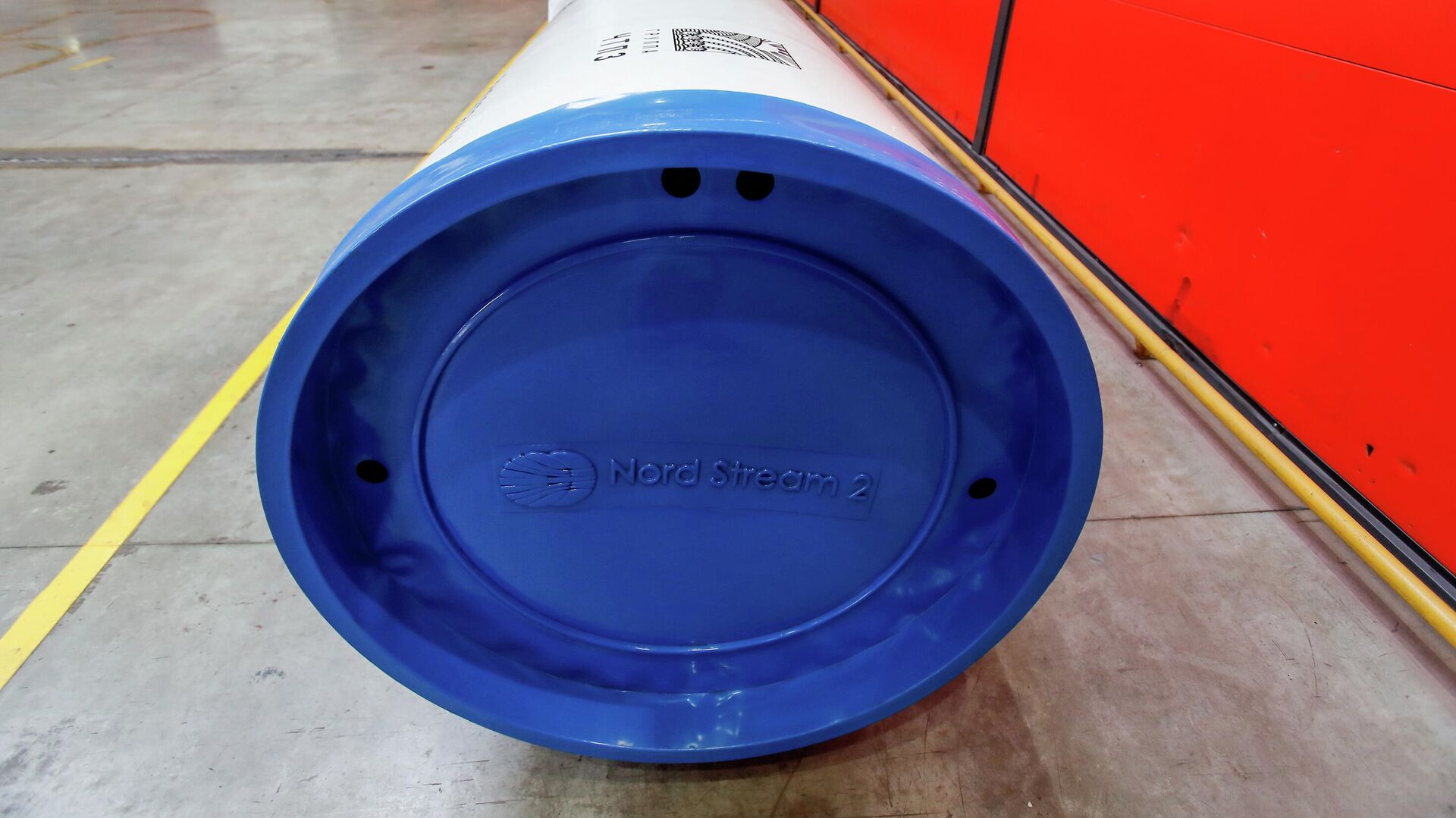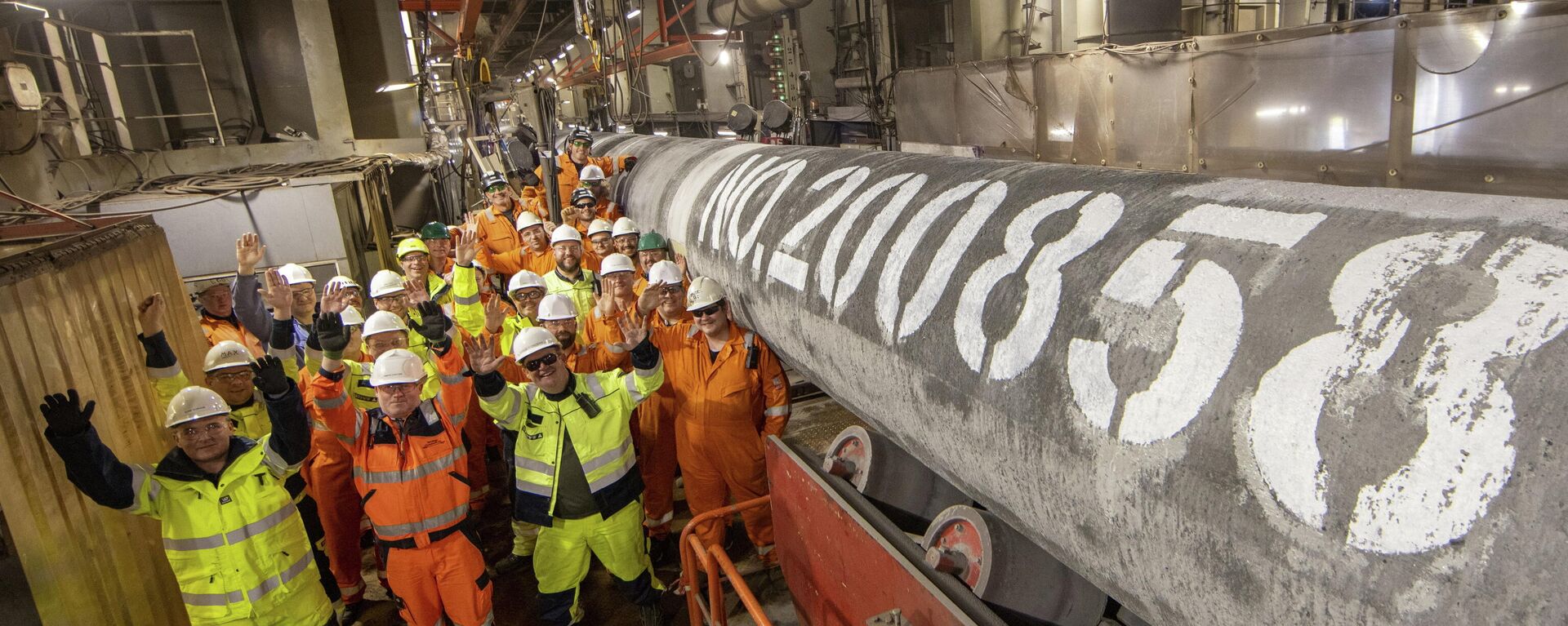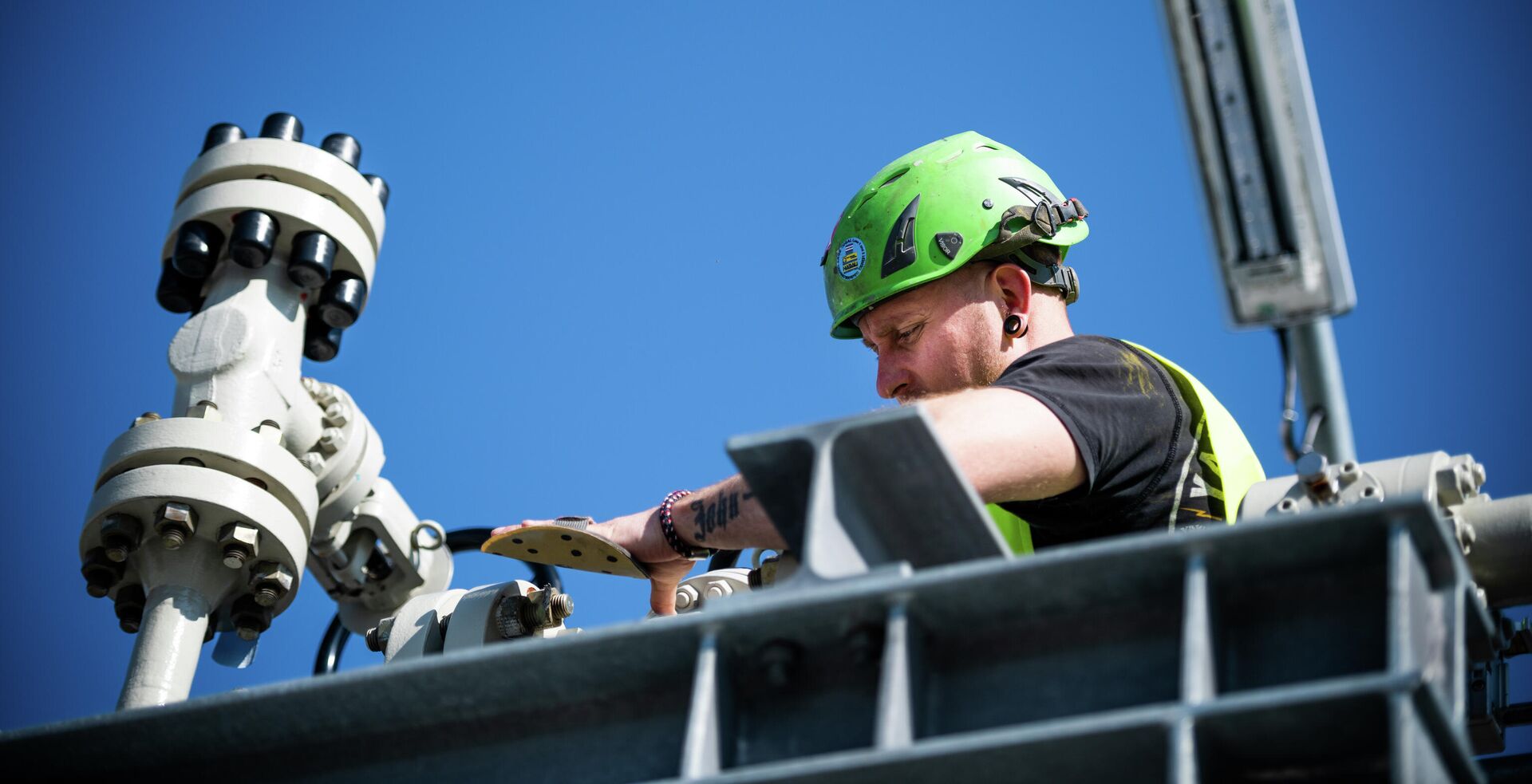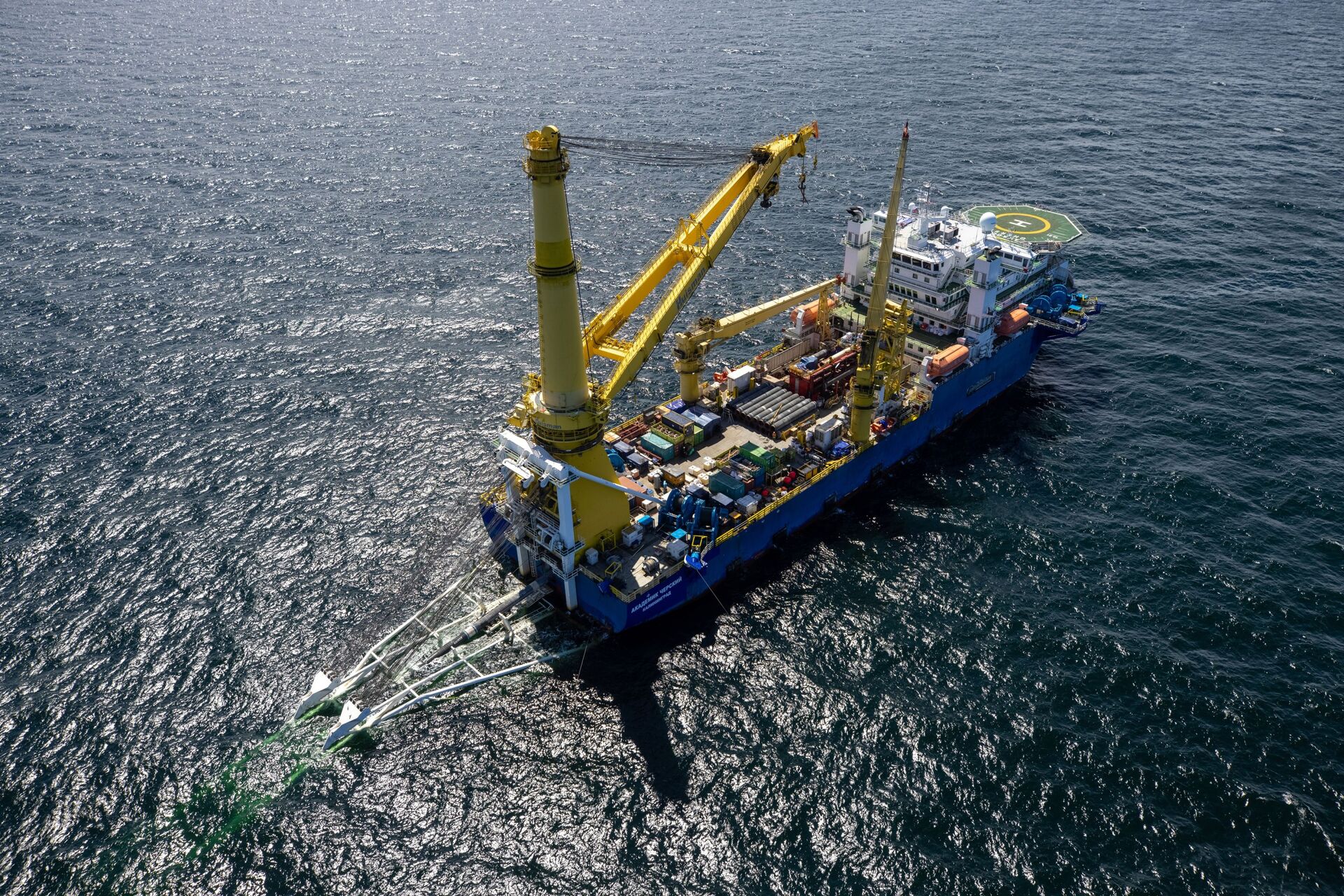Ukraine Accuses Russia of Using Nord Stream 2 Certification as ‘Weapon' in 'Hybrid War’
13:06 GMT 22.11.2021 (Updated: 21:18 GMT 19.10.2022)

© REUTERS / MAXIM SHEMETOV / FILE PHOTO: A view shows Chelyabinsk Pipe Rolling Plant in Chelyabinsk
Subscribe
German energy regulator Bundesnetzagentur (BNetzA) suspended the certification of Nord Stream 2 AG, the Gazprom-owned, Swiss-registered company, as an independent operator of the gas pipeline on 16 November, adding that the process will resume after the parent company has transferred capital and personnel to a German subsidiary.
Ukraine’s Foreign Minister Dmytro Kuleba claims that Russia is seeking to take advantage of loopholes in European legislation to ensure special conditions for Nord Stream 2, reported local media.
“But we insist that there should be no exceptions," emphasised Kuleba, speaking in an interview for Ukraine’s Channel 24.
The Foreign Minister urged his country’s partners to close ranks and insist the European legislation be fully applied to the Nord Stream 2 gas pipeline despite efforts by Russian lobbyists and lawyers.
"Together with a number of EU countries and the European Commission, Ukraine insists that Nord Stream 2 be completely in line not only with the spirit but also with the letter of the EU's Third Energy Package. We are working to prevent Russia from turning Nord Stream 2 into a Nord weapon," stated Kuleba.
The top Ukrainian diplomat claimed that Russia was exerting pressure on the EU on several fronts of its “hybrid war” by manipulating the Nord Stream 2 certification process. "Nord Stream 2 was long supposed to have been launched and put into operation, but the fact that it is still not working and we are fighting it is the result of our joint efforts," said the minister.

Berlin Should ‘Speed Up’ Certification of Nord Stream 2 to Avoid Higher Energy Prices: Trafigura CEO
19 November 2021, 15:54 GMT
According to Ukraine’s foreign minister, the ongoing migration crisis on the Polish-Belarus border, alleged military build-up on the part of the Russian Federation along the border with Ukraine, Russia's actions ostensibly seek to paralyse the Normandy format and the Minsk process for a Donbas settlement are “all elements of the same game, aimed to up pressure on the EU to force the bloc to accept concessions”.
Western media has repeatedly reported on the alleged Russian military build-up since late last month, pointing to large-scale joint military exercises with Belarus. In response, Moscow dismissed the reports as not corresponding to reality. Russian President Vladimir Putin, in turn, pointed to the provocative nature of the recent exercises conducted by the United States and a number of its allies in the Black Sea.

A Nord Stream 2 employee stands on a platform in the Nord Stream 2 Baltic Sea pipeline's receiving station, where six and a half million cubic meters of natural gas per hour will be processed and delivered to downstream pipelines at the right pressure, in Lubmin, Germany
© Sputnik / Dmitrij Leltschuk
/ Regarding Nord Stream 2, tailored to carry Russian gas to Europe along the Black Sea bed, the Ukrainian Foreign Minister insisted that it was a political project for Moscow, not a commercial one. According to Kiev, the certification of Nord Stream 2 was a question of whether Russia’s Gazprom, the owner of the project, would be granted a privileged position in the European gas market to the alleged detriment of participants and consumers, as well as of Ukraine as a transit provider of gas.
Ukraine has been vehemently reiterating that European energy law requires that the operator of the pipeline - the Gazprom-owned, Swiss-registered company Nord Stream 2 AG - be fully unbundled and independent from the Russian majority state-owned multinational energy corporation, and that rules on “third-party access” as well as “non-discriminatory, transparent and cost-reflective tariffs” be applied to the entire pipeline.
Nord Stream 2 Certification
The Ukrainian Foreign Minister’s remarks come as the German regulator Bundesnetzagentur (BNetzA) earlier suspended the certification process for Nord Stream 2 AG, the pipeline operator, stating that it needed to form a company under German law to get an operating licence. European unbundling rules require pipeline owners to be different from suppliers of gas flowing in them to ensure fair competition.
"The certification procedure will remain suspended until the main assets and human resources have been transferred to the subsidiary and the Bundesnetzagentur is able to check whether the documentation resubmitted by the subsidiary, as the new applicant, is complete. When these requirements have been fulfilled, the Bundesnetzagentur will be able to resume its examination in the remainder of the four-month period set out in law, produce a draft decision and deliver it to the European Commission for an opinion, as provided for in the EU legislation on the internal market," the regulator added.
The German energy regulator was also reported as having invited Ukraine’s National Joint Stock Company Naftogaz and LLC Gas Transmission System Operator (GTSOU) to the certification process, which is to be completed by January 2022. Ukraine, which currently has a gas transit agreement with Russia, has been a vocal opponent of the pipeline, fearing imminent revenue losses after its commissioning.
It has also echoed claims by the US that the pipeline threatens the energy security of Ukraine and Europe. Moscow, however, has repeatedly said that it would continue relying on Ukraine's transport capacities to pump gas to Europe in the coming years despite building additional pipelines.

The Russian pipe-laying vessel Akademik Chersky is working on a section of the Nord Stream 2 gas pipeline in German waters.
© Photo : Nord Stream 2 / Axel Schmidt
Construction of Nord Stream 2 was completed in early September 2021. A joint venture by Russia's Gazprom and Western European energy companies ENGIE, OMV, Shell, Uniper and Wintershall Dea, Nord Stream 2 is a 1,230-km twin gas pipeline along the bottom of the Baltic Sea to complement the existing Nord Stream 1 network.
The network is capable of transporting up to 1.9 trillion cubic feet (55 billion cubic metres) of gas annually from Russia to Europe, thus doubling Nord Stream's capacity. Despite long being defended by its participants as a purely economic and not political venture, the project for the 1,230 km pipeline has been forced to tackle a plethora of challenges, ranging from negotiating operating terms and obtaining clearances from involved countries, to US sanctions, imposed in December 2019 against a key contractor, Switzerland-based AllSeas.
Washington, also driven by ambitions to sell Germany and Eastern Europe its more expensive, tanker-delivered liquefied natural gas, has long claimed the Nord Stream 2 project would leave Ukraine without money from Russian gas transit, while making Europe dependent on Russian gas – allegations that Moscow dismissed as unfounded.
Last month Russian President Vladimir Putin said Russia could start delivering natural gas to Europe via the Nord Stream 2 pipeline as soon as Moscow gets the green light from Berlin.
“If the German regulator hands its clearance for supplies tomorrow, deliveries of 17.5 billion cubic metres [of gas] will start the day after tomorrow”, Putin emphasised.

